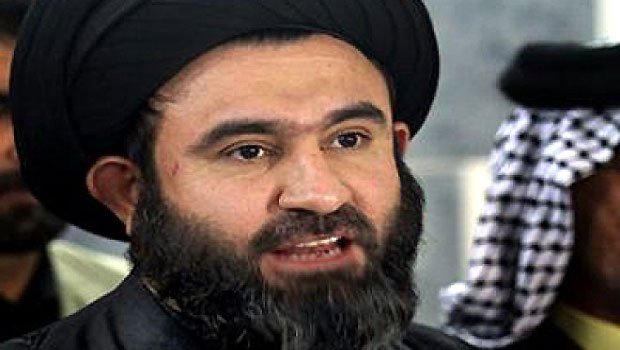
Iraqi Hezbollah Chief Wathiq al-Battat. (Asharq Al-Awsat Photo)
The Iraqi government sought to downplay the existence of this group, even after it claimed responsibility for the recent rocket attacks on the camp housing members of the Iranian opposition group, the Mojahedin-e Khalq Organization (MKO). However, after he issued statements that alarmed leaders among Iraq’s Sunnis, the government issued an arrest warrant for Battat, alleging that his organization was responsible for last week’s car bombings in Baghdad.
Since then, rumors about his plans, the size of his organization, and even about his whereabouts have swirled around Iraq.
After being tracked down by Asharq Al-Awsat, he spoke by telephone about some of these issues, including the charges leveled against him and his group.
As to his location, Battat claimed that he is presently staying in a fortified dwelling in Al-Najaf, together with a force of “tens of thousands of mujahedeen”. He added that his movements were carefully planned, because he “is not new to jihad and political action.”
He dismissed claims that he had broken with the Hezbollah parent organization, calling such reports “untrue.” He went on to allege that his accuser was himself a defector from the party, Muhammad Majid Al-Nasiri, who had left with “no more than 10 people.”
Regarding his plans for the future, he pointed to the recent name change of his organization as an indicator of its intentions and goals: “The party’s name Hezbollah–Islamic Resistance was changed into Hezbollah–Islamic Renaissance because the US occupiers withdrew from Iraq and, accordingly, there was no need for resistance for which we worked before the withdrawal. We now begin the phase of Islamic renaissance.”
As to his party’s organizational links with Lebanese Hezbollah and Iran, Battat said only: “The Hezbollah Organization, with both its branches in Lebanon and Iraq, is directly linked to velayet-e faqih [supreme jurisconsult] Ayatollah Khamenei.”
Questioned about the role of Al-Mukhtar Army, and whether or not it functions as the military wing of Hezbollah in Iraq, Battat said: “In fact this is a misunderstanding. Hezbollah–Islamic Renaissance is an organized party and consists of 378,000 men all of whom are trained and armed. They are ready for action.”
He added: “In the past, we carried out about 1,200 operations against Americans. We also struck the Kuwaiti Port of Mubarak. And I would like to say here that it is Hezbollah, not the Al-Mukhtar Army that poses a real danger to our enemies in Al-Qaeda and other armed groups. This is because Al-Mukhtar Army is present in the provinces and its task is to protect both the Sunnis and Shiites, now that the security agencies have failed to provide protection for them.”
Battat claimed to have good relations with Iraqi Sunnis, whom he claimed could be found in the ranks of his group. He said: “Not only Shiites, but also Sunnis have joined the Al-Mukhtar Army. I personally maintain good relations with Sunni brothers in the Sunni areas. I always contact them and they contact me.”
Battat also responded to the Iraqi government’s allegations about his involvement in the car bombings that struck Baghdad earlier this month. He told Asharq Al-Awsat: “With regard to the accusation that Al-Mukhtar Army or Hezbollah carried out the bombings, the question is what benefit is gained from such bombings. Why should we bomb populated Iraqi areas, which we claim to protect?”
He adds: “Moreover, the interior ministry, through its most senior undersecretary, denied this charge when it announced that the car bombs came from Al-Fallujah. This is what we warned of in the past, but they did not listen to us.”
When asked about his sources of information about the bombings, Battat replied: “Many of the people who belong to Al-Qaeda, the Naqshabandi Army, and armed groups were previously officers and officials in the former security agencies, and we were in contact with them in the past.”
He added: “This relationship has continued until now. Sometimes we contact them to obtain information from them in exchange for money. However, the security forces did not listen to us, and at the same time they failed to provide security and properly handle intelligence information.”
Asked how he planned to respond to the warrant issued for his arrest, Battat denied that he had done anything to endanger Iraq’s security, and asserted that he was against sectarian conflict. He said: “we are against sectarian war and will forcefully stand against it by protecting the Sunnis before the Shiites. Nevertheless, I would like to say that if the government carries out this action, it will find itself in a losing battle.”
